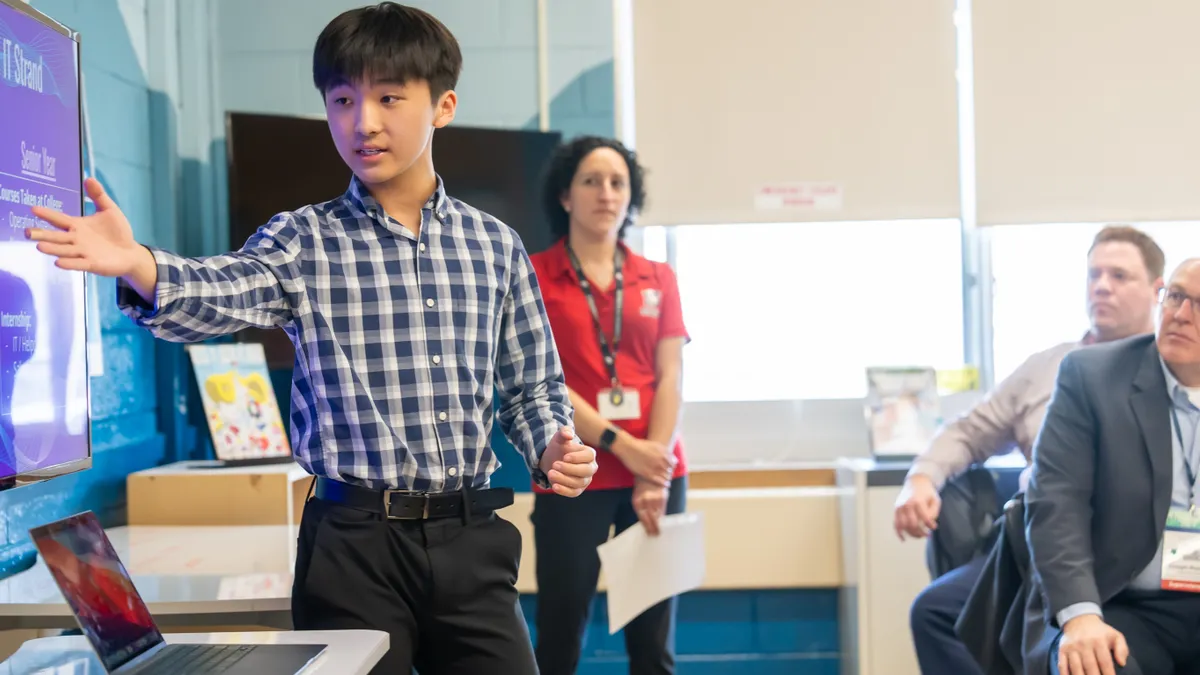“As a former superintendent and advocate for public education, I believe it's imperative that we include and incorporate student voice in the work that we do. We're here to serve students, so students deserve a seat at the table,” said Julie Mitchell, former longtime superintendent of Rowland Unified School District in California. After more than a decade of doing this work, Mitchell has seen first hand how intentionally and systematically elevating student voice at all levels of a school district makes a tangible difference. Through these transformative leadership experiences, students learn that their voices matter, and that they should use them to drive their own learning journeys.
That's why—even in her retirement—Mitchell is supporting other leaders in addressing this vital topic. Teaming up with the Digital Promise League of Innovative Schools, Mitchell is leading a “League Learning Collaborative” designed to bring school and district leaders across the country together to tackle shared challenges around this topic and implement successful strategies to foster deeper student engagement in their school communities. Members have the opportunity to learn from other leaders who are successfully making gains around this issue by engaging regularly in peer-to-peer learning, co-creating solutions, and sharing best practices.
Mitchell is thrilled to support other leaders in finding the best ways to take action in their own communities and has a wide range of experiences to pull from. She has integrated hundreds of student voices and perspectives into her district’s strategic planning processes, and has conducted individual and small group empathy interviews with students of all ages which have cultivated a culture that emphasizes trust- and relationship-building. She can also speak to what it was like to co-create a national, student-led virtual conference (Digital Promise’s Students for Equitable Education Summit), organized and led by high school students from 12 districts across the nation.
“It’s a life-changing experience for [students] because they realize what they have to say matters, and they can see change,” said Mitchell. “That’s the other really important part when you incorporate student voice. When we gather students together, they have to see something change.”
In leading the learning collaborative for student voice and engagement, Mitchell facilitates conversations concerning common challenges around time, logistics, and changing adult mindsets, including their own. They discuss actionable solutions, like how to schedule meaningful opportunities to be inclusive of a full range of diverse students with conflicting schedules, what it really takes to foster a culture of honoring student voices, how adults can learn to let go of the reigns, and how all of these efforts ultimately lead to students learning to grow and lead.
In their latest meeting, held via Zoom, they discussed what letting go really looks like in practice, and how it can be deeply uncomfortable for adults, yet worth the risks. For Michelle Rothmeyer, communications coordinator at D.C. Everest Area School District in Wisconsin, this conversation really stood out to her. “It's learning to lead together with students. You’re letting go of power, but you’re letting go and leading together. That was powerful [to hear] because it's uncomfortable, but also really invigorating and exciting.”
Rothmeyer shared that she always leaves these meetings deeply inspired and energized with valuable insights that she is ready to put into action in her own district, where they are getting ready to kickoff their superintendent student advisory council. “Getting to see what other people are doing and talk about how we can be better is so exciting…the exchange of ideas from districts all across the nation and of all different sizes.”
For Casey Nye, superintendent of D.C. Everest Area School District in Wisconsin, getting to hear about districts across the country that have a deep and integrated student-centered culture, and where it’s clearly a win-win situation for everybody, is deeply motivating and inspiring for him. “Not only are we empowering kids and letting them lead, but we’re making better, smarter decisions together, which is taking a weight off of us too. If public education needs anything right now, it needs a reminder that we are all in this together,” he said.
“We build communities and communities build us—it goes both ways. If we can help kids see the impact of their leadership the way I've seen happen in other places and have that cycle pick up momentum, that would be really exciting,” Nye said, “It’s about putting kids first and trusting them enough to let them lead.”
Check out how other leaders in the League of Innovative Schools are prioritizing and elevating student voice across their districts.
Are you interested in tapping into a national learning community through the League of Innovative Schools?
Sign up to be the first to hear when the League’s next application cycle is live.







 Dive Awards
Dive Awards



